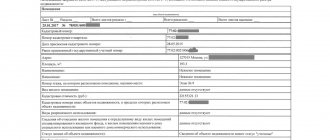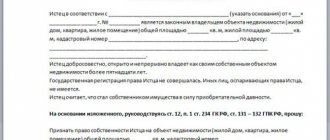Legal consultation by phone:
Offices in Moscow and the Moscow region: Directions
The right of property is one of the fundamental rights that is guaranteed to any citizen and organization by the Constitution of the Russian Federation. In the field of entrepreneurial activity, this institute becomes even more important.
Legal regulation of property rights is carried out in accordance with the Civil Code of the Russian Federation, Land Code of the Russian Federation, etc. And, of course, it is necessary to point out that disputes regarding the recognition of ownership rights arise in relation to the most valuable property, which in business activities can be:
- real estate, including land plots, various structures, buildings, structures, industrial complexes (enterprises), etc.;
- equipment used and used by entrepreneurs as part of their commercial activities (especially often in judicial practice, disputes arise when pledging the relevant equipment, its transfer in exchange for other property, etc.);
- goods in circulation of the relevant entrepreneur (especially in cases where such an entrepreneur carries out trading activities both within the framework of concluding supply agreements and within the framework of other agreements, for example, when storing relevant goods).
Legal basis for recognition of rights
The presentation by an interested party of a demand for recognition of the right through the court aims to eliminate all doubts about the ownership of the right to this particular person, while in order to satisfy the claims, a set of conditions must be present:
- dispute about law;
- violation of the plaintiff’s rights or their challenge;
- and, finally, evidence of the plaintiff’s ownership of the disputed object.
The special legal nature of real estate determines that a claim for recognition of the right of ownership of real estate is one of the special (in rem) remedies. Enshrined Art. 12 of the Civil Code of the Russian Federation, methods of protection relate to substantive legal ones, since their source is substantive legal norms.
Peculiarities of consideration of cases on claims for recognition of property rights
A necessary condition for protecting a right by recognizing this right is the plaintiff proving his right to the property. These rights may arise from title documents presented by the plaintiff, testimony of witnesses, or other evidence that the disputed item or other property belongs to the plaintiff. The existing presumption of actual possession protects the rights of the plaintiff in actual possession of the disputed property. This presumption is not reflected in the legislation, but in fact it is valid. It comes to the aid of the court if the court has no other way to close the chain of evidence except by using this presumption. There is no obligation of the court to use it, but the court has the right to make such a decision in a specific case, if it is not possible to resolve the case in accordance with the available evidence.
Statutes of limitation do not apply to claims for recognition of ownership. This combines them with negatory claims. Such a claim is not based on a specific violation of the rights of the owner; it is based on the ongoing illegal behavior of a third party.
Analysis of everything said above allows us to draw a reasonable conclusion: claims for recognition are non-contractual demands emanating from property owners. The essence of the requirement is to establish the fact that the ownership of the disputed thing belongs to the plaintiff before third parties. And this requirement is not connected with a specific requirement to return the property or remove other obstacles that are not related to the deprivation of possession of the thing.
As already noted, all three types of claims - negatory, vindication, recognition of property rights - can only have as their object an individually defined thing. This determines their greatest effect and distribution in protecting the right of ownership of real estate, because real estate is always an individually defined thing.
The procedure for recognizing ownership of real estate
If there is no record in the state register of registration of your ownership of real estate, then you have not acquired ownership rights. However, the law may provide otherwise (clause 2 of article 8.1, clause 1 of article 131 of the Civil Code of the Russian Federation). Thus, you can demand recognition of ownership, in particular:
- if it arose before 01/30/1998, that is, before the Law on Registration of Rights to Real Estate came into force, and was not registered in the Unified State Register of Real Estate (part 1 of article 69 of the Law on State Registration of Real Estate, paragraph 59 of the Resolution of the Plenums of the Supreme Court of the Russian Federation and the Supreme Arbitration Court of the Russian Federation dated April 29, 2010 No. 10/22);
- if you are the legal successor of an organization that was reorganized and was the owner of real estate (clause 2 of article 218 of the Civil Code of the Russian Federation, part 2 of article 69 of the Law on State Registration of Real Estate, clause 59 of the Resolution of the Plenums of the Supreme Court of the Russian Federation and the Supreme Arbitration Court of the Russian Federation dated April 29, 2010 No. 10/22);
- due to acquisitive prescription (Article 234 of the Civil Code of the Russian Federation, clause 19 of the Resolution of the Plenums of the Supreme Court of the Russian Federation and the Supreme Arbitration Court of the Russian Federation dated April 29, 2010 No. 10/22).
Grounds for recognition of ownership of real estate through the court
A claim for recognition of ownership of real estate, as we answered above, is one of the special (in rem) remedies, which inevitably determines the features of evidence in this category of court cases. Thus, when considering cases on recognition of ownership of real estate, the arbitration court proceeds from the disposition of the relevant substantive rules (for example, Articles 554 and 607 of the Civil Code of the Russian Federation).
Consequently, the necessary evidence in the case of recognition of ownership of real estate includes evidence that makes it possible to individualize the disputed object of real estate.
The evidence and grounds for recognizing the right are
- the construction of the facility is completely completed (that is, the citizen must have an act of putting the building into operation);
- the person has in his hands the title papers, thanks to which the object was transferred into ownership (for example, a deed of transfer and a deed of gift);
- a citizen can provide other evidence (testimony of witnesses, receipts and checks for payment for construction work and materials, cadastral and technical passports, etc.);
- long-term and continuous possession of the object (at least 15 years, according to Article 234 of the Civil Code of the Russian Federation).
and,
- on recognition of ownership rights to unauthorized construction;
- on recognition of rights to reconstructed objects in the absence of permits obtained in the prescribed manner;
- on the recognition of rights to individual residential buildings, including those included in cottage villages, as well as to premises in apartment buildings that are built on land plots not intended for these purposes, including land plots in respect of which the law prohibits construction such objects.
The importance of determining the subject of proof
Circumstances that make it possible to individualize the disputed object of real estate are among the necessary evidence, since in their absence it is impossible to establish the facts of the subject of proof.
Individualization can be carried out by providing information that allows identifying the property to be transferred (for example, the location of the disputed real estate, the approximate area, other characteristics and properties determined, in particular, in accordance with the project documentation).
An example from the practice of the Supreme Court of the Russian Federation
If the requirement to recognize the ownership right as absent is stated by the real owner in relation to a person whose right to property was registered illegally, it should be satisfied. But only if the court has reliably established that the registration of property violates the right of the owner and it cannot be protected by filing a claim to reclaim property from someone else’s illegal possession.
In what cases will it not be possible to recognize ownership rights?
We do not recommend filing a claim for recognition of ownership rights if you, in particular:
- created the property after 01/30/1998. In this case, ownership rights arise from the moment of its state registration (Article 219 of the Civil Code of the Russian Federation). In this situation, you should collect a package of documents to register ownership of the object, and if registration is refused, challenge it;
- sold the property under a real estate purchase and sale agreement, the transfer of ownership to the buyer was registered, but the buyer did not pay the money for it. In this case, we recommend demanding termination of the contract and the return of the property transferred to the buyer as unjust enrichment. Based on the judicial act of return, you will be able to register your property rights (clause 65 of the Resolution of the Plenums of the Supreme Court of the Russian Federation and the Supreme Arbitration Court of the Russian Federation dated April 29, 2010 No. 10/22);
- you bought an object under a real estate purchase and sale agreement, paid for it, but you cannot register your ownership right, since you do not have all the necessary documents (Decision of the Supreme Court of the Russian Federation dated May 23, 2016 in case No. 304-ES15-18474);
- In order to purchase an apartment (premises), we entered into an agreement to participate in the shared construction of an apartment building, which has not yet been put into operation. Premises in an apartment building under construction are not objects of unfinished construction, since it is impossible to locate real estate objects in an object of unfinished construction (apartment building). You can only register the right of common shared ownership of an unfinished apartment building itself, and not of the premises (apartments) in it (Letter of the Ministry of Economic Development of Russia dated February 16, 2018 No. OG-D23-1407). Therefore, filing a claim for recognition of ownership of the premises (apartment) is inappropriate. In this situation, you need to wait until the house is put into operation, and only after that register ownership of your premises (apartment). If the construction of an apartment building for some reason cannot be completed within the period stipulated by the share participation agreement and (or) it is not put into operation, then you can file a claim for recognition of ownership of a share in the form of a premises (apartment) in an unfinished apartment building home.
Grounds for acquiring property rights
Russian legislation establishes various grounds for the acquisition/recognition of property rights, and, accordingly, its recognition for the relevant entrepreneur. The list of such grounds is established in Chapter 14 of the Civil Code of the Russian Federation. However, it is worth noting that not all grounds for the acquisition/recognition of property rights specified in this chapter of the code are applicable specifically to commercial activities.
In relation to business activities, the following provisions and grounds for recognition of property rights acquire a certain interest. Firstly, this is the recognition of ownership of newly created real estate. It should be noted that in order to recognize the right of ownership of real estate, it is necessary to comply with certain formal procedures, namely, going through the registration procedure, that is, obtaining a certificate of ownership of the property.
As judicial and legal practice shows, recognition of ownership of real estate, as a rule, is accompanied by significant problems in proof, namely, the existence of the right of the corresponding owner to specific real estate. In view of this, problems also arise during the registration procedure, namely the refusal to issue the specified certificate for real estate.
A similar situation occurs in the process of concluding contracts in relation to real estate, in particular contracts of sale, exchange, etc. Many entrepreneurs often do not fully correctly assess the provisions of the relevant agreement, as a result of which this agreement may not only protect and respect their interests, but even on the contrary, go against them.
Another quite common situation that arises in the field of recognition of property rights is the acquisition of ownership rights to an unauthorized building. In accordance with Art. 222 of the Civil Code of the Russian Federation - an unauthorized construction is recognized as a residential building, other building, structure or other real estate that is created on a land plot that is not allocated for these purposes in the manner established by law and other regulations, or created without the availability/receipt of this is all the necessary permits or with a significant violation of construction and urban planning norms and regulations.
Unauthorized buildings are very popular in the process of carrying out commercial activities. Their construction is associated with the desire to expand your business, increase your income or reduce existing costs. However, as a rule, construction is accompanied by gross violations of current Russian legislation, which makes it impossible for the relevant entrepreneur to put the corresponding constructed facility into circulation. In such cases, organizations will require the assistance of qualified lawyers from the Vector Rights Group, specializing in litigation regarding the recognition of ownership of the relevant real estate.
How is ownership of real estate recognized through a court decision?
Claims for recognition of ownership rights are one of the most common and sought-after methods of protecting rights used in cases of improper fulfillment of obligations under real estate transactions.
According to the position of the Supreme Arbitration Court of the Russian Federation, set out in letter dated August 21, 1997 No. S5-7/OZ-581 “On the Federal Law “On State Registration of Rights to Real Estate and Transactions with It” (clause 12), state registration of rights for real estate, established by a decision of a court, arbitration court or arbitration tribunal, is carried out in accordance with Article 28 of the Federal Law “On State Registration of Rights to Real Estate and Transactions with It.” Rights to real estate established by a court decision are subject to state registration on a general basis.
What needs to be proven in court to recognize ownership of real estate
In court, you will need to prove first of all:
- circumstances with which the legislation connects the emergence of property rights (clause 59 of the Resolution of the Plenums of the Supreme Court of the Russian Federation and the Supreme Arbitration Court of the Russian Federation dated April 29, 2010 No. 10/22). This can be proven with the help of various documents, for example, a charter, a constituent agreement, a resolution of a state or municipal authority on the approval of a privatization plan, on the reorganization of your legal predecessor;
- ownership of real estate, the right to which is registered with another entity (clause 58 of the Resolution of the Plenums of the Supreme Court of the Russian Federation and the Supreme Arbitration Court of the Russian Federation dated April 29, 2010 No. 10/22). This can be proven using, for example, inventory cards for recording fixed assets, property tax declarations, and witness statements;
- inability to register property rights in the manner prescribed by law, for example, if there are inconsistencies between various documents, the elimination of which will require an examination. Recognition of property rights is one of the ways to protect civil rights (Article 12 of the Civil Code of the Russian Federation). In practice, it is considered as an exceptional method of protection.
Please note that you may need to prove other circumstances depending on the basis for the emergence of ownership rights, the characteristics of the property, and the relationship with the defendant. For example, if you recognize the right of ownership by virtue of acquisitive prescription, you need to prove the fact of bona fide, open and continuous ownership of real estate as your own for 15 years (clause 1 of article 234 of the Civil Code of the Russian Federation, clause 15 of the Resolution of the Plenums
What documents are needed to file a claim in court?
In accordance with Article 132 of the Code of Civil Procedure of the Russian Federation, the claim must be supplemented with documentary evidence of the correctness and claims of the plaintiff. Such papers include:
- technical certificate of the premises;
- a document on the basis of which the applicant received the right to dispose and own the object (for example, a deed of gift);
- form with paid fee;
- applicant's passport;
- power of attorney (if the citizen acts through a representative);
- transfer deed confirming the fact of receipt of the premises.
Depending on the circumstances of the case, documents confirming your claims may also be, for example:
- a copy of the application for privatization of real estate, endorsed by the employee of the institution who accepted the application;
- evidence of your actions indicating the actual acceptance of the inheritance, including testimony of witnesses, an extract from the personal account of the residential premises indicating the absence of debts, copies of receipts for your payment of housing and utilities;
- discovered will;
- the notary's answer about the literal meaning of the will, the conclusion of a linguistic or handwriting examination.
What to do if you don’t have all the necessary documents
If you do not have documents confirming the circumstances on which you base your claim, file a petition for the court to obtain the necessary evidence. In the petition, indicate what circumstances can be confirmed or refuted by this evidence, the reasons preventing the receipt of evidence, as well as the location of the evidence. The court will issue you a request to obtain evidence or request evidence on its own (Parts 1, 2, Article 57 of the Code of Civil Procedure of the Russian Federation);
How to competently file a claim
The statement of claim must be drawn up in writing in accordance with the requirements specified in Article 131 of the Code of Civil Procedure of the Russian Federation. To draw up a statement of claim, please include the information listed in Part 2 of Art. 125 Arbitration Procedure Code of the Russian Federation. In particular, you need to indicate the circumstances necessary to satisfy the claim. Attach to the claim evidence of all the circumstances specified in it.
Therefore, the document must include the following information:
- name of the district court;
- Full name of the plaintiff, his residential address, telephone or postal address (if the applicant acts through a representative, his personal data is also indicated);
- name and address of the defendant (this can be either an individual or an organization);
- the essence of the appeal (how the interests or rights of the applicant were violated);
- plaintiff's claim;
- circumstances of the case;
- a list of documents supplementing the claim;
- evidence of the legitimacy of the claims;
- the price of the application (depending on the value of the disputed object);
- applicant's signature.
After submitting documentation and a claim to the court for recognition of ownership rights, the citizen must wait for the judge’s conclusion. Legal practice shows that most often similar cases are resolved in favor of the plaintiff.





